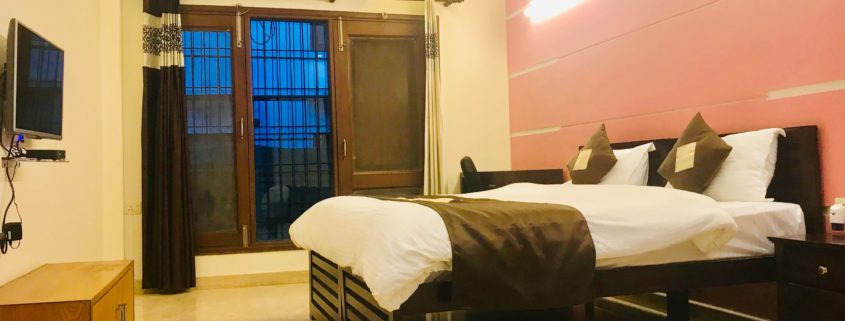Serviced Apartments vs. Hotels: Making the Right Choice for Corporate Travel
Serviced Apartments vs. Hotels: Making the Right Choice for Corporate Travel
In the realm of corporate travel, the choice of accommodation can significantly impact the overall experience. Traditionally, hotels have been the go-to option for business travelers. However, the landscape is evolving, and serviced apartments have emerged as a formidable alternative. In this comprehensive comparison, we’ll weigh the pros and cons of serviced apartments and hotels, helping corporate travelers make the right choice for their specific needs and preferences.
The Shifting Paradigm of Corporate Travel
1.1 Hotels: The Traditional Choice
Hotels have long been the default accommodation for business travelers. They offer a familiar environment, essential amenities, and a range of services to cater to guests’ needs.
1.2 The Rise of Serviced Apartments
In recent years, serviced apartments have gained popularity in the corporate travel sphere. These fully furnished and equipped apartments offer a unique blend of comfort, space, and flexibility, making them an attractive option for professionals on the move.
The Face-Off: Serviced Apartments vs. Hotels
2.1 Space and Comfort
Serviced Apartments:
- Pro: Serviced apartments provide ample space with separate living, dining, and sleeping areas, offering a home-like atmosphere.
- Pro: They often come with fully equipped kitchens, allowing travelers to prepare their meals, a feature rarely found in hotels.
- Pro: Privacy is a key advantage, with secure and secluded environments.
- Con: Daily housekeeping may not be as frequent as in hotels.
Hotels:
- Pro: Hotels offer the convenience of daily housekeeping and room service.
- Pro: Many hotels provide on-site dining options, room service, and minibars.
- Con: Standard hotel rooms can be smaller and lack the spaciousness of serviced apartments.
- Con: Dining in hotels can be expensive.
2.2 Cost-Effectiveness
Serviced Apartments:
- Pro: Serviced apartments often offer cost savings in the long run, especially for extended stays, due to the ability to cook and do laundry in-house.
- Pro: Utilities and amenities like high-speed internet are typically included in the price.
Hotels:
- Pro: Hotels provide convenience but may incur additional costs for dining, laundry, and internet access.
- Con: Extended stays in hotels can become costly, especially when dining out for every meal.
2.3 Flexibility
Serviced Apartments:
- Pro: Serviced apartments cater to both short-term and long-term stays, providing flexibility for corporate travelers.
- Pro: They often have flexible check-in and check-out options, accommodating varying schedules.
Hotels:
- Pro: Hotels offer standard check-in and check-out times but may be less suitable for extended stays.
2.4 On-Site Amenities
Serviced Apartments:
- Pro: Serviced apartments may have amenities like fitness centers, laundry facilities, and communal spaces for socializing and networking.
Hotels:
- Pro: Hotels typically offer on-site restaurants, bars, fitness centers, and concierge services.
Making Your Decision
3.1 Consider Your Travel Objectives
- If you need more space and prefer a home-like environment, serviced apartments are an excellent choice.
- If you value daily housekeeping, room service, and on-site dining, hotels may be more suitable.
3.2 Evaluate Your Budget
- If you’re looking for cost-effective options, serviced apartments can provide significant savings for extended stays.
- If you prioritize convenience and are willing to pay for hotel services, a hotel might be your preference.
3.3 Assess the Length of Your Stay
- For short stays, hotels offer convenience and may have a central location.
- For extended stays, serviced apartments provide the space and flexibility needed for a comfortable experience.
3.4 Consider Amenities and Services
- If you require specific amenities like a fully equipped kitchen, laundry facilities, or a private workspace, serviced apartments excel in providing these.
- If you prefer on-site dining, room service, and daily housekeeping, hotels are better equipped to meet these needs.
The Future of Corporate Travel
4.1 A Blend of Choices
The future of corporate travel is likely to involve a blend of accommodation choices to cater to varying needs. Professionals may opt for hotels for short business trips and serviced apartments for more extended assignments, embracing the best of both worlds.
4.2 Personalized and Sustainable Options
The evolving trends in corporate travel include a demand for personalized experiences and eco-friendly practices. Both serviced apartments and hotels are adapting to incorporate these elements into their offerings.
In Conclusion: Tailoring Your Stay
The choice between serviced apartments and hotels for corporate travel ultimately depends on your specific needs, preferences, and the nature of your trip. Both options offer unique advantages, and savvy corporate travelers are increasingly tailoring their accommodation choices to align perfectly with their objectives, ensuring a comfortable and productive stay, whether in a serviced apartment or a hotel room.




